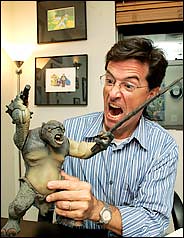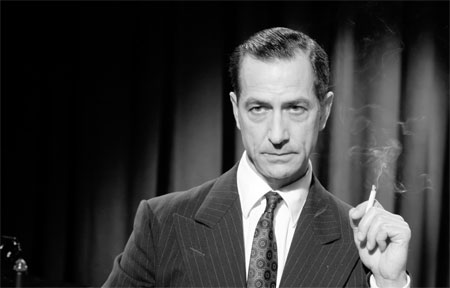“Roger Ailes was right when he predicted at the beginning of the television era that in the future all politicians would have to be performers. But politicians are, for the most part, lousy performers.Their advisers are pretty awful at what they do too. In the absence of inspiration, they have fixed upon the crudest, most negative and robotic forms of communication. They’ve made moments like Robert Kennedy’s in Indianapolis next to impossible.” TIME‘s Joe Klein laments the dawn of the soundbite-heavy, market-tested-within-an-inch-of-its-life consultants’ republic.
Category: Pundits
Will to Power.
“[T]errorism is not the only new danger of this era. Another is the administration’s argument that because the president is commander in chief, he is the ‘sole organ for the nation in foreign affairs.'” From the Right, George Will makes the conservative case against Dubya’s “monarchical” pretensions regarding the NSA wiretaps. (Via Cliopatria.)
Red Letterman Day.
“I’m not smart enough to debate you point to point on this, but I have the feeling, I have the feeling about 60 percent of what you say is crap.” Along the lines of (2006 Oscars host) Jon Stewart on Crossfire in 2004, a driven-to-anger David Letterman goes after guest Bill O’Reilly on Cindy Sheehan, the war in Iraq, and his “fair and balanced” drivel. “I agree to you, with you that we have to support the troops. They are there, they are the best and the brightest of this country…however, that does not eliminate the legitimate speculation and concern and questioning of ‘Why the Hell are we there to begin with?’” (Via Dumbmonkey.)
All the President’s Men.
Washington Post editor Bob Woodward testifies to the Fitzgerald grand jury about a third senior White House official involved in disclosing the identity of Valerie Plame, besides Libby and Rove. (Woodward’s statement.) This means Libby likely wasn’t the first to leak Plame’s identity, but the new info has no bearing on his perjury or obstruction of justice indictments.
For Woodward’s part, his statement and public comments about the case alternate between high dudgeon (“It was the first time in 35 years as a reporter that I have been asked to provide information to a grand jury”) and open ridicule (“When I think all of the facts come out in this case, it’s going to be laughable because the consequences are not that great.“) Mostly, he just seems cranky that he — award-winning journalist Bob Woodward! — was forced to take time away from another puff piece book on Dubya to testify about a felony in the White House. But this isn’t news. Frankly, Woodward has been embarrassing his legacy for years…almost any of his talking-head stints on Larry King illustrate that. Since at least the early Clinton years, he’s been more desirous of maintaining his high profile and insider status than in promoting good journalism or good government. (And in that, he’s reflected the trajectory of many in the newsmedia.) Update: The Post is somewhat irked.
Let the Gravitas Begin.

“No, this program is dedicated to you, the heroes!…And who are the heroes? The people who watch this show — average, hardworking Americans. You’re not the elites, you’re not the country club crowd. I know for a fact that my country club would never let you in. But you get it! And you come from a long line of it-getters!” Reviews come in grippy for the first installment of The Colbert Report, Comedy Central’s answer to The O’Reilly Factor. His opening monologue (at the official site) is well-worth watching.
Exhuming McCarthy.

While perhaps a bit too black-and-white in terms of the history, George Clooney’s Good Night, and Good Luck is nevertheless a somber and captivating paean to Edward R. Murrow, his televised expose of Joe McCarthy, and, by extension, the Pioneer Days of Television Journalism. (In this last regard, it’s somewhat reminiscent of the excellent Clooney-produced live TV version of Fail Safe a few years ago.) It’s also assuredly a smoother, subtler, and more accomplished bit of muckraking than, say, Tim Robbins’ recent and lamentably over-the-top Embedded. Once again displaying the surprisingly strong directorial sense he exhibited in Confessions of a Dangerous Mind, Clooney also benefits here from a smartly written script which refuses to talk down to its audience, the crisp black-and-white cinematography, and quality performances across the board. As a result, what could have been an above-average History Channel documentary is instead a powerful and intelligent work of cinema that’s easily one of the better films out this year.
Admittedly, as Jack Shafer pointed out in Slate, Good Night, and Good Luck is rather narrowly focused, and works better as an impassioned and articulate morality play than it does as sound history. The Murrow of this film is saintly to a fault (although David Straitharn ameliorates this with a sardonic and multifaceted performance that may well get some nods come award time.) And there’s very little historical context offered herein, either for the origins of the McCarthy hysteria or for the Wisconsin Senator’s ultimate downfall, which had more to do with picking a fight with the army than with the Murrow broadcast.
That being said, I really like the way Clooney uses archival footage in this film. For one, Clooney was clever to follow Murrow’s example and let Joe McCarthy hoist himself on his own petard. Having the real McCarthy excoriate Murrow as the “leader of the jackal pack” gives the film a sense of history (and menace) that an actorly turn couldn’t have provided. For another, Clooney, who definitely appears to have done his homework, is unafraid to cut to real historical footage — the Annie Lee Moss hearings, for example — for extended periods, and just let the inherent drama of the real proceedings speak for itself. As a result, the history feels alive and contemporary, no mean feat when so many other historical films seem to use the past as merely exotic window dressing. Could the film have been more nuanced in its appraisal of both Murrow and McCarthyism? Undoubtedly. (Then again, nuanced appraisals weren’t exactly McCarthy’s strong point, either., nor is it a long suit of his current defenders.) But on the whole, Good Night, and Good Luck is, I think, a worthy exercise in historical filmmaking, and one with some obvious relevance in light of today’s entertainment-addled, sideshow-obsessed news media.
Movie-wise, there are a few small problems. I think the GN, & GL should have done either more or less with Robert Downey, Jr. and Patricia Clarkson as Wershbas Joe and Shirley — their particular plight doesn’t tie in to the rest of the story very well. And, while Ray Wise is good as the broadcaster-at-wits-end Don Hollenbeck, he’s also typecast in my mind — I kept expecting him to break into the Leland Palmer dance. All in all, though, Good Night, and Good Luck manages to enliven both the staid television studios of Fifties CBS and this historical moment with smoky jazz, languishing cigarettes, and ominous shadows. As the show says, see it now.
In the Crossfire.
“The self-described ‘prince of darkness’ appears blinded by the light. He cannot see himself as everyone else does. He has called so much attention to himself that he casts no shadow at all. He is completely exposed.” Sidney Blumenthal puts the skewers to Bob Novak.
Signing off.
Just Let it Go.
Hey…still busy over on this end with the textbook project. At this point, I’m about ready to up and pull a Novak, but, fortunately, the end is in sight.
The Vanishings.
“A damsel must be white. This requirement is nonnegotiable. It helps if her frame is of dimensions that breathless cable television reporters can credibly describe as ‘petite,’ and it also helps if she’s the kind of woman who wouldn’t really mind being called ‘petite,’ a woman with a good deal of princess in her personality…Put all this together, and you get 24-7 coverage.” The Post‘s Eugene Robinson deconstructs the “Damsel in Distress” genre so beloved by today’s newsmedia. Obviously, if a friend or family member disappeared under strange circumstances, I might want some degree of media coverage in order to help find her. But, the amount of round-the-clock national attention devoted to these sad stories (and rubbernecking drek like the Michael Jackson trial) is patently ridiculous. Hey, don’t look now, but our nation is at war right now.
